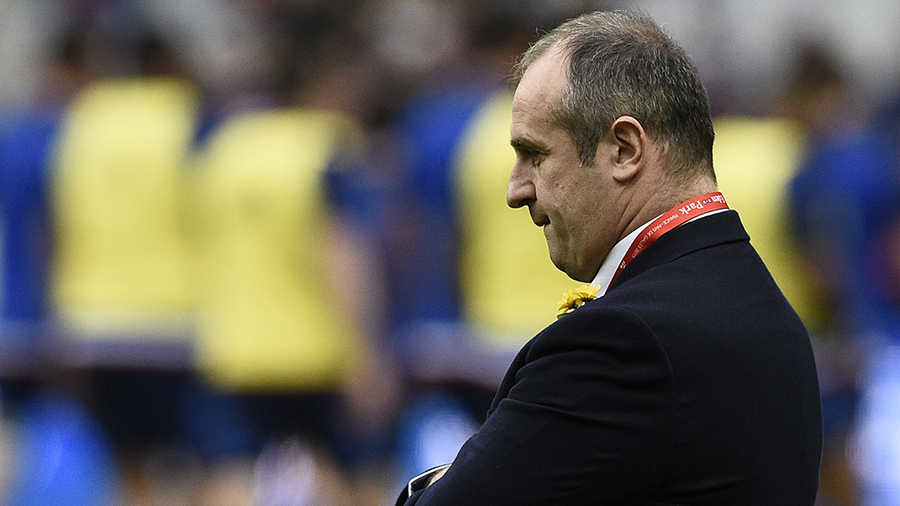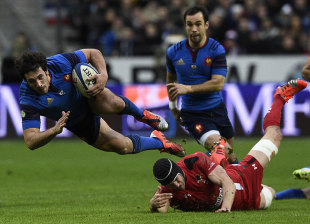|
France v Wales verdict
Saint-Andre's France future in the balance
Huw Richards
February 28, 2015

Philippe Saint-Andre looks on © Getty Images
Enlarge
He is famously one of the few Saints among many sinners to have been associated with the French national team. But after yet another sub-par performance by Les Bleus, Philippe Saint-Andre may not be far from the sticky end often associated with canonisation. When he was appointed after the last World Cup, British writers in particular saw it as the beginning of a fresh era. After more than a decade of mad coach syndrome under first Bernard Laporte then Marc Lievremont, sanity would be restored under (very helpfully from our point of view) a coach whose experience outside France is reflected in his excellent English. Four years on it looks very much plus ca change, if not worse. The much-maligned Lievremont after all achieved a championship, a second place and two third places in his four Six Nations seasons.
Saint-Andre has yet to take France into the top half. Having completed their first bottom-half hat-trick since the 1920s last season, he'll need wins from both of France's remaining matches - the last at Twickenham - to avoid a four in four. It is hard not to sympathise. He was a terrific player and he remains a sympathetic personality - the one coach who managed to leaven the Six Nations media launch this season (an unloved, but essential chore) with a touch of warmth and humour. His response 'What, I lost my job already ?' to the Scottish writer who accidentally asked him how he felt about playing against France with a new coach, was a lovely moment of self aware, spontaneous comic timing. And everyone is aware of the handicaps under which France's coach operates. Even more than England's incumbent, he must reckon with the influence of powerful clubs who do not always accept that the national cause should take priority over their own. Roy Hodgson might recognise the problems of running a national team based on a league whose TV-driven wealth has led to an influx of global talent. Any French coach must also reckon with the twin streams making up French rugby culture. There is the swift-moving improvisational game associated with the concept of 'French flair', a phrase which were it not so usefully alliterative must by now have fallen into disuse. And then there is the power game after which Jacques Fouroux, that Napoleonic figure surrounded by ferocious giants, hankered. The dream of merging that with the discipline of New Zealand teams has haunted every French coach since, but has remained unattainable. Saint-Andre has been no exception, delivering increasingly large teams whose hope is that, if all else fails, they can better the opposition into submission. The extent to which that game plan has failed is evident in their record against Wales - the most consistently physical Six Nations adversary during his tenure.

Wales have now beaten France four times in a row for the first time since the 1950s
© Getty Images
Enlarge
When Brice Dulin squeezed over in the corner for a score which at least, combined with Camille Lopez's touchline conversion, gave us an exciting finish, it was the first time France had scored against Wales in 308 minutes of Six Nations action. Wales have now beaten France four times in a row for the first time since the 1950s, winning by an aggregate total of 79 points to 34. A fixture once associated with brilliant play has become a serial arm-wrestle and it is the French who are being forced into submission. No wonder the band struck up a rendition of 'Those Were The Days' within 15 minutes of the start. French rugby was always more nuanced and complex than the cliché of 'French flair' admitted. Elan and panache always rested to some extent on a base of well-applied muscularity. But it is as if it is determined to throw off all aspects of the game. Saint-Andre's preference for muscular, limited South Africans over skilled French players like Morgan Parra, a scrum-half any other European team would love to have, and Brice Dulin has had an air of despair about it. Both added something to France's performance, but insufficiently to make the difference needed to a team which looks to have lost its way. For France now the issue is whether to stick or twist. They have invested four years in Saint-Andre. To change now with the World Cup only a few months away would be a desperate measure. And possible alternatives like Fabien Galthie and Guy Noves have lost something of their lustre. There is also a case to be made that the systemic problems of the French game, with its inability to generate stable long-term answers to the club v country battle and array of foreign talent - this Welsh XV had as many starting players from France as from Cardiff and Llanelli combined - is beyond the powers of any single coach. But for the moment, a few months away from another World Cup, France look in worse shape than they ever were under Lievremont. Whether Saint-Andre will get the chance to emulate his much-criticised predecessor by taking his team to a World Cup is very much in the balance. © ESPN Sports Media Ltd
| |||||||||||||||
Live Sports
Communication error please reload the page.
-
Football
-
Cricket
-
Rugby
-
- Days
- Hrs
- Mins
- Secs
F1 - Abu Dhabi GP
Abu Dhabi Grand Prix December 11-131. Max Verstappen ()
2. Valtteri Bottas (Mercedes)
3. Lewis Hamilton (Mercedes)
4. Alexander Albon ()
5. Lando Norris ()
6. Carlos Sainz Jr ()
-
ESPNOtherLive >>
Golf - Houston Open
Snooker - China Open
Tennis - Miami Open

